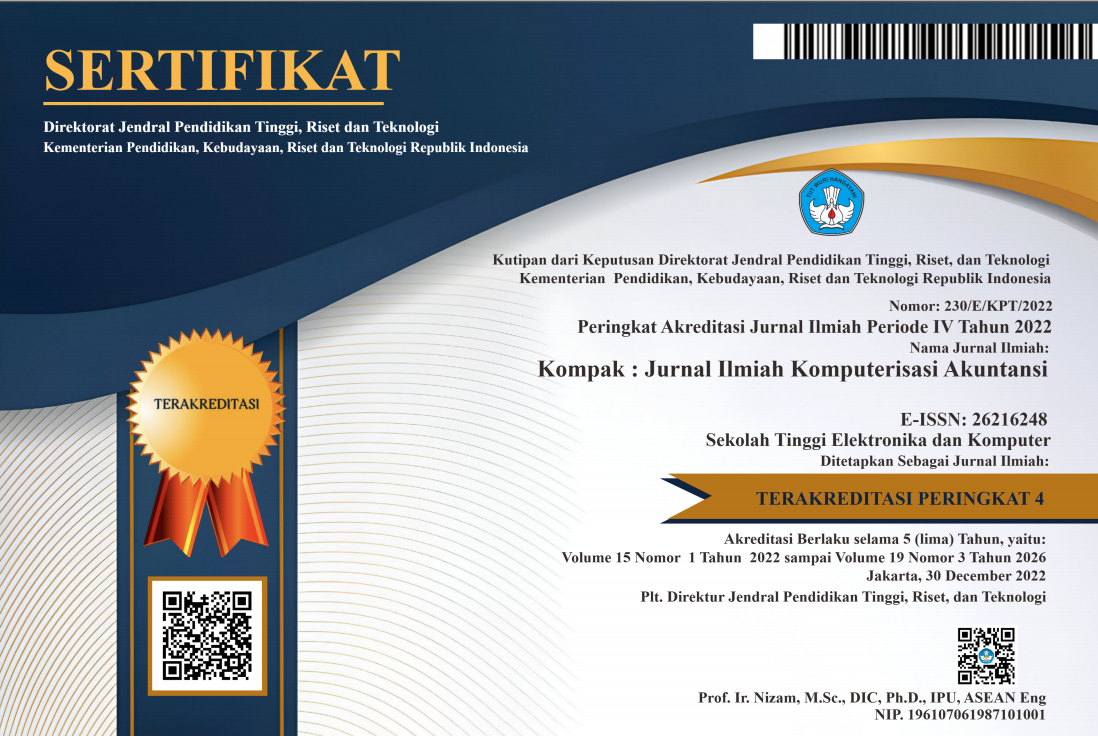Pengaruh Hubungan Antara Government E-Readiness dan Citizen E-Readiness Dengan Kepatuhan Wajib Pajak
DOI:
https://doi.org/10.51903/kompak.v16i2.1378Keywords:
Compliance Level, Tax, Government Services, E-government, E-ReadinessAbstract
The level of tax compliance has been a concern of researchers and governments for decades. Various efforts have been made by the government in order to increase taxpayer compliance including the use of information and communication technology in service delivery (e-government) but have not yielded optimal results. Various studies and research related to taxpayer compliance and its relationship with e-government have also been carried out but are still focused on e-government services regardless of the level of readiness (e-readiness) of the government itself as a service provider (government e-readiness) or from the community side as service users (citizen e-readiness). Writing this article aims to build a new hypothesis with the variable level of readiness (e-readiness) as a variable that affects government services which will ultimately increase the level of taxpayer compliance. Previous research or relevant research is used to strengthen the theory and phenomenon of the relationship or influence between variables.
References
[2] Al-Oasimi, Khalid; Alheraish, Abdulmohsen and Bakry, S.H. (2008). STOPE Based Approach for eReadiness Assesment Study . International Journal of Network Management 18: 65–75
[3] Afrin, Rifat., Nabila, Nisha., Afrin, Rifat., (2019). Predicting e-tax service adoption: Integrating perceived risk, service quality and TAM. Journal of Electronic Commerce in OrganizationsVolume 17, Issue 3, Pages 71 – 1002019
[4] Bakry S. H., (2004). ―Development of e-Government: A STOPE view‖, International Journal of Network Management, vol.14 No. 5, pp. 339-350.
[5] Bhuasiri, W., Zo, H., Lee, H., & Ciganek, A. P. (2016). User acceptance of e-government services: Examining an e-tax filing and payment system in Thailand. Information Technology for Development, 22(4), 672–695. [Taylor & Francis Online], [Web of Science ®], [Google Scholar]
[6] Carter, L., & Weerakkody, V. (2008). E-government adoption: A cultural comparison. Information System Frontiers, 10(4), 473–482.
[7] Chen YN, Chen HM, Huang W and Ching RK. (2006). E-government strategies in developed and developing countries: An implementation framework and case study. Journal of Global Information Management 14(1): 23–46.
[8] Davis, Fred. (1989). Perceived Usefulness, Perceived Ease of Use, And User Accepptance of Information Technology. MIS Quarterly 13(3) : 319—339. DOI: 10.2307/249008
[9] Dukic, et.al., (2016). Public administration employe “rediness and acceptance of e-governemnt” : Finding from a Croatian Survei. International Jurnal Information Development. Volume: 33 issue: 5, page(s): 525-539
[10] Elbahnasawi. (2014). E-Government, Internet Adoption, and Corruption: An Empirical Investigation. Jurnal World Development Volume 57, May 2017, Page 114-126. https://www.sciencedirect.com.ezproxy.ugm.ac.i d/. Di unduh pada tanggal 25 Agustus 2018.
[11] Sergey, S. (2004). Russia e-readiness assessment. Institute of Information Society, Moscow.
[12] Heeks, R. (1999). Reinventing government in the information age. In Richard Heeks (Ed.), Reinventing government in the information age, international practice in IT-enabled public sector reform (pp. 9-21). London: Routledge.
[13] Heeks, R. (2003). Most eGovernment-for-Development Projects Fail: How can Risks be Reduced?. eGovernment Working Paper no. 14.
[14] Heeks, Richard. 2001. i-Government Working Paper Series : Understanding e-Governance for Development. UK : Institute for Development Policy and Management University of Manchaster.
[15] Indrajit. 2006. Electronic Government. Yogyakarta: Penerbit Andi
[16] Matthieu, Bellon., Norris, Dablas., Salma, Khalid. (2023). Technology and tax compliance spillovers: Evidence from a VAT e-invoicing reform in Peru. Journal of Economic Behavior and OrganizationVolume 212, Pages 756 – 777
[17] Nento, Nugroho dan Selo. 2017. Model e-Readiness untuk Mengukur Tingkat Kesiapan Pemerintah dalam penerapan Smart Government studi Kasus Pemerintah Provinsi Gorontalo. Seminar Nasional Inovasi dan Aplikasi Teknologi di Industri 2017. ITN Malang, 4 Februari 2017. ISSN 2085-4218
[18] Night, S., & Bananuka, J. (2019). The mediating role of adoption of an electronic tax system in the relationship between attitude towards electronic tax system and tax compliance. Journal of Economics, Finance and Administrative Science, 25(49), 73–88. [Crossref], [Google Scholar]
[19] Potnis, Devendra Dilip & Pardo, Theresa A. (2010). Mapping the evolution of e-Readiness assessments. The current issue and full text archive of this journal is available at www.emeraldinsight.com/1750-6166.htm
[20] Peters, T.. 2005. E-Readiness in Developing Countries : Current Status and Prospect towrd the millennium development Goals e-ready for What? Prepared for info Dev. Infodev, Vol.27
[21] Pardo, et.al. 2012. E-Government Interoperability : Interaction of Policy, Management, Technology Dimensions. Social science computer review 30 (I) 7-23
[22] Rashed, et.al., 2010. Measuring e-readiness for egovernment in Developing Country : Comparative Study. International Arabic Conference of e-Technology IACe-T'2010 March 30-31, 2010 , Kuwait.
[23] UNDESA, UN Department of Economic and Social Affairs (2016). Government for Sustainable Development. publicadministration.un.org. diakses pada tanggal 30 Agustus 2018.
[24] Yulan, Qi & nAna, Che Azmi. (2021). Factors affecting electronic invoice adoption and tax compliance process efficiency. Transforming Government: People, Process and PolicyVolume 15, Issue 1, Pages 150 – 1689















.png)



